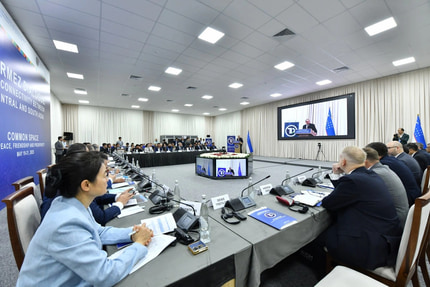Central Asia - South Asia interconnectivity dialogue took place in Termez on May 19-21. The new dialogue initiated by Uzbekistan to bring the two regions closer together. will be seeking for a new formula for cooperation with Kabul amid the cautious approach demonstrated by major players.
The dialogue was organized by the Institute for Strategic and Interregional Studies under the President of Uzbekistan, the Ministry of Foreign Affairs and the Chamber of Commerce and Industry.
The three-day meetings brought together about 200 delegates from Central and South Asia, Europe, the CIS, Asia, and the Middle East. The Uzbek authorities expect that regional cooperation wiould be the format in which Afghanistan can be integrated into the international economy, despite the political unrecognized status of its authorities.
The Central Asian countries delagated a high level of participation, at the level of deputy foreign ministers, which indicates the seriousness of the regional interest in the Afghanistan-related matters.
South Asia's participation was more modest - mostly online or through embassies. According to observers, this may be due to the aggravation of relations between the two key powers of the region - India and Pakistan, which are now focused on the settlement of the bilateral crisis.
"A strong consensus has built in the Central Asia regarding deepening cooperation with South Asia," said Eldor Aripov, Director of the Institute of International Relations, in his opening remarks at the forum, pointing to the progress in the CASA-1000, TAPI and Trans-Afghan Corridor projects. According to him, despite the fact that trade between the regions has exceeded $5 billion, it still does not really tap to the real potential.
The First Deputy Foreign Minister Bakhromjon Aloev said that it was vital to implement infrastructure projects, primarily the Trans-Afghan Railway project - from Termez to the South seas. According to him, the new highway "is capable of transforming the trade and economic landscape of a vast macro-region, providing Central and South Asia with a new driver for mutual growth in trade and investment" and opening the way to the formation of a nearly two-billion-dollar common market.
The emphasis was also placed on the participation of guests from Kabul. "Afghanistan is ready to actively participate in all regional initiatives, including transport, infrastructure, electricity transmission, trade, education, climate change and sustainable development," said Deputy Foreign Minister of the Islamic Emirate Mohammad Naeem Wardak. He called on the international community to view Afghanistan "as a reliable partner" and promote investment in the country's economy.
However, international players remain reserved. "The US decision alone to suspend funding for its humanitarian programs has reduced the aid to Afghanistan by almost 30%, which has already caused tangible difficulties," underscored Roza Otunbayeva, of the UN Secretary General’s Envoy for Afghanistan.
In her opinion, the key condition for successful economic integration remains the issue of security. Roza Otunbayeva proposed including Afghanistan in regional collective security mechanisms. "Without regular dialogue between the security forces of the countries of the region and Afghanistan, sustainability in the security sphere is impossible," the UN special representative believes.
According to the delegates in the dialogue, in the current situation, cooperation between Central Asian countries is "a visible factor in working with Afghanistan." Thus, Uzbekistan continues to promote the idea of โโ"regionalization" of the Afghan agenda. Tashkent expects that Afghanistan's neighbors and regional organizations will be able to take on the functions of involving it in joint projects in the socio-economic sphere, while other international players are cautious about Kabul.















